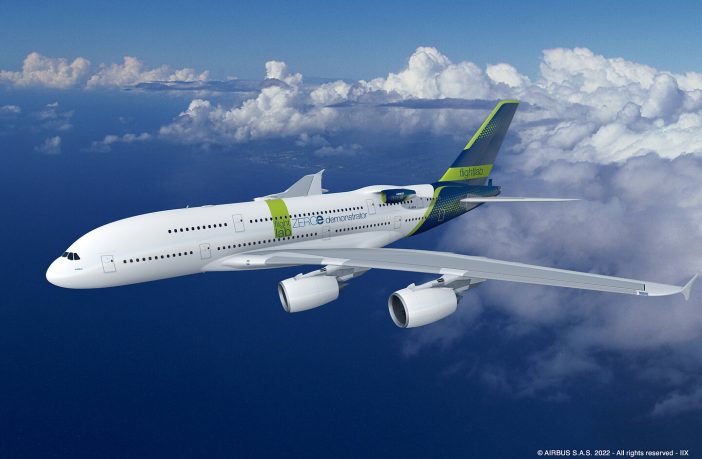- Airbus has signed a partnership agreement with CFM International, a 50/50 joint company between GE and Safran Aircraft Engines, to collaborate on a hydrogen demonstration programme that will take flight around the middle of this decade.
- The programme’s objective is to ground and flight test a direct combustion engine fueled by hydrogen, in preparation for entry-into-service of a zero-emission aircraft by 2035.
- The demonstration will use a A380 flying testbed equipped with liquid hydrogen tanks prepared at Airbus facilities in France and Germany.
- Airbus will also define the hydrogen propulsion system requirements, oversee flight testing, and provide the A380 platform to test the hydrogen combustion engine in cruise phase.
CFM International (CFM) will modify the combustor, fuel system, and control system of a GE Passport turbofan to run on hydrogen. The engine, which is assembled in the US, was selected for this program because of its physical size, advanced turbo machinery, and fuel flow capability. It will be mounted along the rear fuselage of the flying testbed to allow engine emissions, including contrails, to be monitored separately from those of the engines powering the aircraft. CFM will execute an extensive ground test program ahead of the A380 flight test.
Related news: South Africa’s petrochemicals giant, Sasol, confirms advancements for hydrogen derived jet fuel
“This is the most significant step undertaken at Airbus to usher in a new era of hydrogen-powered flight since the unveiling of our ZEROe concepts back in September 2020,” said Sabine Klauke, Airbus Chief Technical Officer. “By leveraging the expertise of American and European engine manufacturers to make progress on hydrogen combustion technology, this international partnership sends a clear message that our industry is committed to making zero-emission flight a reality.”
“Hydrogen combustion capability is one of the foundational technologies we are developing and maturing as part of the CFM RISE Program,” said Gaël Méheust, president & CEO of CFM. “Bringing together the collective capabilities and experience of CFM, our parent companies, and Airbus, we really do have the dream team in place to successfully demonstrate a hydrogen propulsion system.”
CFM shares Airbus’ ambition of fulfilling the promise they made in signing the Air Transport Action Group goal in October 2021 to achieve aviation industry net-zero carbon emissions by 2050 by developing and testing the technology necessary to make zero emissions aircraft a reality within the ambitious timeline defined.
Airbus has a long-standing relationship with CFM and its parent companies, GE Aviation and Safran Aircraft Engines and, together, the partners have established a great track record of delivering high-performance products that meet the needs of airline customers.
Author: Bryan Groenedaal











